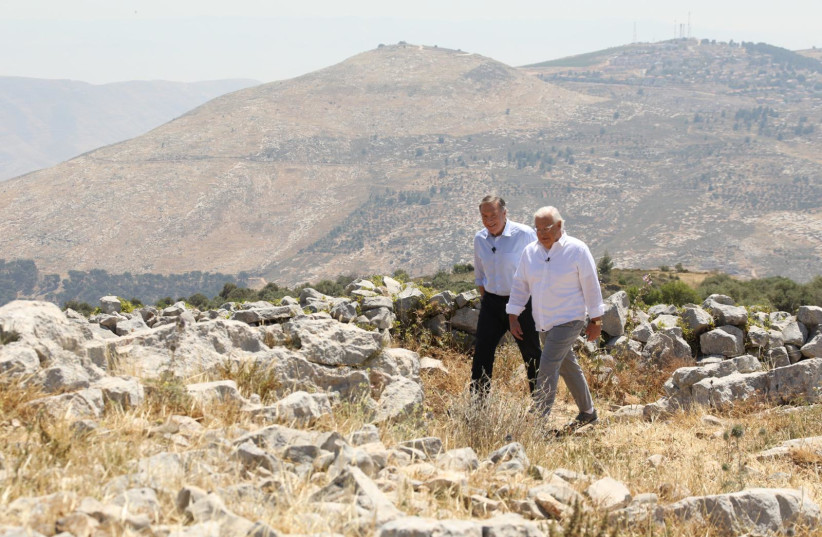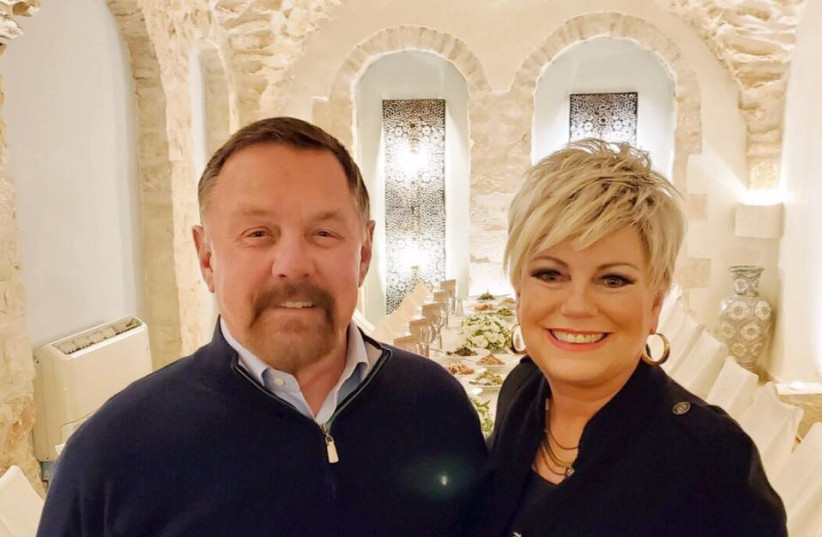Mike Pompeo named top Christian ally of Israel for 2023 – exclusive
As worshipers gather in the Holy City for the annual Feast of Tabernacles, 50 individuals who hold biblical and modern Jerusalem close to their public consciousness and religious devotion have been honored by the Israel Allies Foundation (IAF).
The IAF published its annual list of Israel’s Top 50 Christian Allies to coincide with the holiday. Like the pilgrims who will flood the streets of Jerusalem to celebrate Sukkot, the list spans many continents and denominations. It includes prominent activists and leaders from religious and political spheres.
No. 1 on the list this year is former US secretary of state and CIA director Mike Pompeo, followed by Brazil’s 38th president, Jair Bolsonaro. In the third spot is a couple: Pastor Larry and Tiz Huch.
“We are honored every year to recognize these incredible men and women of faith from across the world,” said IAF President Josh Reinstein. “They are Israel’s greatest friends and most loyal allies. Due to their years of hard work, we are seeing embassies moved to Jerusalem, antisemitism called out, bomb shelters built, pro-Israel policies enacted at the highest levels of government – the impact of their support is truly limitless.”
The IAF is the central coordinating body for 53 Israel Allies Caucuses worldwide, actively rallying political backing for Israel rooted in common Judeo-Christian principles. The IAF said that it views the relocation of embassies to Jerusalem by the United States, Guatemala, Honduras, and Papua New Guinea, alongside the proliferation of anti-BDS legislation across 37 US states as outcomes directly influenced by Christian policymakers who championed these initiatives.
This is the IAF’s fourth annual list. Reinstein said it started as a way to thank Christian Zionists for their work on behalf of Israel.
“Christians, not countries, are standing with Israel, and they are bringing their countries with them,” Reinstein told the Magazine. “These leaders are why we see a lot of the diplomatic successes we see today, and we wanted a way to recognize these courageous leaders around the world.”
The list has become more international each year, Reinstein noted, as Christian Zionism expands beyond North America’s roughly 70 million evangelicals to countries in South America, Africa, and the Middle East.

BEFORE BOLSONARO became president of Brazil, the country was not friendly with Israel. On the contrary, Brazil was working closely with Iran and had historically sided with the Palestinians over Israel.
However, under the former president, Israel and Brazil became good friends.
“It is not a coincidence that Christians, who believe in the Bible, supported Bolsonaro’s candidacy; and after he was elected, he made incredible displays of friendship toward Israel,” Reinstein said.
In 2019, for example, Brazil opened a new trade mission in Jerusalem. The countries also signed pacts to cooperate in defense and cybersecurity.
As a leader, Bolsonaro was not without controversy. He was known for making disparaging comments about women, LGBTQ, and Black people. Bolsonaro also came under fire for his ill handling of the pandemic. However, Reinstein said that the Top 50 list does not consider other areas of success – indeed not domestic policy – when it chooses its winners.
“We are looking for Christian leaders who believe in the Bible and stand with Israel,” Reinstein stressed, adding that the IAF only names politicians who are out of office so as not to have any direct political influence.
Hence the reason for Pompeo’s selection this year, he said. While in office, Pompeo was instrumental in moving the US Embassy from Tel Aviv to Jerusalem, recognizing the Golan Heights, brokering the Abraham Accords, and supporting Israel’s right to Judea and Samaria.
During this time, he established what became known as the Pompeo Doctrine, which held that the United States no longer viewed Israeli presence in Judea and Samaria and the settlements there as “inconsistent with international law.”
Since leaving the White House, Pompeo has continued to support Israel. He and former US ambassador to Israel David Friedman recently released the feature-length film Route 60: The Biblical Highway. It tells the story of the 146-mile ribbon of pavement that weaves through the heart of the Holy Land, also known as the Path of the Patriarchs.

According to Box Office Mojo, the film was shown in more than 1,000 mainstream theaters and sold more tickets per theater on its first two nights than any other American film being shown simultaneously. It also helped bring the ancient and biblical significance of the West Bank to the masses.
Pompeo affirmed to the Magazine that he thinks it’s important for every Christian to recognize Jerusalem and Israel as central to their faith. “Christians have an obligation to ensure that Israel continues to be the rightful homeland of the Jewish people,” he said, specifically highlighting how Judea and Samaria connect the Bible to the land.
“The facts on the ground,” continued Pompeo, “unmistakably demonstrate that the Book speaks the truth… all of Israel should be important to those who share the Christian and Jewish faiths.”
THE HUCHES are the founding and senior pastors of New Beginnings Church in Bedford, Texas. They also run a worldwide ministry, Larry Huch Ministries. Their New Beginnings television program and media ministry are broadcast daily worldwide and followed by hundreds of thousands of people. They raise funds for Israel through these efforts, focusing on aliyah, Holocaust survivors, hospitals, and faith-based diplomacy.
“To me and my family, our ministry is a divine call,” Larry Huch told the Magazine. “I feel like we were put here on Earth to defeat antisemitism, to let the gentile world know how wrong the Church has been in so many ways, and to help them see that the world is changing.”
Huch calls for the Christian people to bless Israel and says that “Jews and gentiles should come together to serve the God of Abraham, Isaac, and Jacob” and that in doing so, God will bless them.

Among the notable honorees is Bishop John Drew Sheard at No. 8, presiding bishop and chief apostle of the Church of God in Christ (COGIC), the most prominent African-American Pentecostal denomination in the United States. In 2022, Bishop Sheard led a contingent of almost 150 delegates and 30 representatives of the National Organization of Black Elected Legislative Women on a tour of Israel – the first official Israel visit by COGIC’s top leader.
Joni Lamb at No. 7 is the co-founder of the Christian Daystar TV Network, through which she hosts television specials to raise awareness, money, and support for Israel and aging Holocaust survivors.
‘I proudly support Israel’
Some others on the list include American televangelist Paula White at No. 5, who served as former president Donald Trump’s pastor, adviser to the White House on Faith and Opportunity Initiatives, and chair of the Evangelical Advisory Board in Trump’s administration.
“My deeply held faith and conviction have aligned me to stand with and support Israel in every possible way,” White said. “The God of Abraham, Isaac, and Jacob made a covenant with the Jewish people and promised them a nation. That nation, Israel, is the foundation and birthplace of my Christian faith.
“I also stand with Israel for geopolitical reasons. Since 1948, the nation of Israel has been America’s staunchest ally in the Middle East. I proudly support Israel and the Jewish people,” she said.
White brought her family to Israel for the first time this year. During her visit, she told The Jerusalem Post that Christians should learn from Jews rather than try to convert them.
“Paul [the apostle] made very clear that God extended his love to the gentiles, but he did not take something from the Jews and tell us to go back and course correct or convert them,” White said. “I do not want to convert Jews or send them to [live in] Israel for the rapture. The plan for salvation for the Jews is God’s.”
Another honoree is Pastor John Hagee at No. 6, founder and national chairman of Christians United For Israel (CUFI), the largest Christian pro-Israel group in the United States, with over seven million members.
Hagee told the Post in March while visiting Israel that he is on a mission to “build a pro-Israel machine that will combat and defeat antisemitism in this generation.”
Feast of Tabernacles

The list highlights German-born Dr. Jürgen Buhler, president of the International Christian Embassy Jerusalem (ICEJ), at No. 13.
“It is so exciting to see God rebuilding Zion, to see Him restoring His people to their land,” Buhler said. “No matter where you live, you too can participate in what God is doing here in the Land of Israel.”
Buhler, however, wants Christians to experience this restoration in the streets of Jerusalem. For 44 years, his ICEJ has hosted the Feast of Tabernacles celebration in the Holy Land.
An awe-inspiring spectacle unfolds during the holiday of Sukkot as thousands of people from around the globe converge upon the Holy City, offering a glimpse into a future where all nations shall gather in unity before God.
The vision was outlined in Zachariah 14:16: “Then the survivors from all the nations that have attacked Jerusalem will go up year after year to worship the King, the Lord Almighty, and to celebrate the Festival of Tabernacles” (King James).
In these few lines, the ancient prophet paints a vivid picture of a world transformed by divine peace, where people from diverse backgrounds and nations unite to worship God in Jerusalem.
In the Torah, Sukkot is one of three pilgrimage holidays on which Jews were called upon to bring sacrifices to God in the Temple. The sacrifice schedule for Sukkot called for 13 bulls on the first day and, after that, one less for each succeeding day, down to seven on the seventh and last day – a total of 70. The rabbis of the Talmud said that the number 70 represented the 70 gentile nations on Earth, and the 70 bulls constituted a prayer on behalf of the non-Jewish world.
When King Solomon completed the building of the First Temple, he called on the nations to come and worship: “May all the nations of the Earth know that the Lord alone is God, and there is no other,” the king said.
Today, this vision is no longer confined to the pages of the Bible. Jerusalem becomes a global hub as thousands of pilgrims travel to celebrate the Feast of Tabernacles.
“This prophetic vision inspired some Christians interested in the Hebraic roots of our faith,” said ICEJ vice president and senior spokesperson David Parsons.
ICEJ welcomes people from 80 to 100 nations each year. The year before COVID, nearly 6,000 pilgrims joined participated in the feast. During the pandemic, the Christian Embassy registered more than 7,000 people for an online experience. And since then, the event has slowly been coming back. Aside from nearly 4,000 people who will be in Israel this year, more than 2,000 have registered to watch the feast online.
Furthermore, the feast is broadcast on God TV and Day Star, reaching hundreds of thousands of viewers.
A particular highlight this year will be a planeload of 250 people from Fiji, including the deputy prime minister, who is coming on an official visit to prepare for moving his country’s embassy to Jerusalem.
Fiji Airways will run the more than 16,000 km. flight, making the airline’s first-ever landing in Israel.
“We are very excited about the Fiji delegation coming and the whole issue of nations coming back to Jerusalem and opening their embassies here,” Parsons said.
In addition, several delegations of Christian groups will come from Muslim-majority countries, Parsons added. In the past, these have included pilgrims from Iran, Iraq, Indonesia, Malaysia, Algeria, Azerbaijan, and Turkey.
“For the third year, we have a delegation of Egyptian Christians coming of 18 to 20 people,” Parsons noted. “More than that would come, but they cannot get visas from Israel’s Interior Ministry. I think if they could, we would have double [the number].”

A HIGHLIGHT of the feast will be when these Christians march through the streets of the Holy City, waving their nation’s flags and handing out sweets and paraphernalia to the locals.
“There is a lot of pride among these delegates, who are here to represent their nations,” Parsons said. “On the other hand, our love of the Bible and our love of Israel unifies us.”
There is some concern that all these Christians are in Israel to spread the gospel and convert Jews, but Parsons said there is a “no proselytizing policy” for anyone registered for the event. He said that most of the feast constitutes Christians talking to Christians, aside from the march and a unique Israeli guest night, where Israeli dignitaries address the visitors at the Pais Arena.
“We do not work with Christians who are interested or actively involved with trying to convert Jews,” said Rabbi Tuly Weisz, founder of Israel365 in Beit Shemesh, which builds bridges between Christians and Jews. “However, we have found that the best way to convince Christians not to try to proselytize is by building relationships with them.
“The minute they understand how offensive and ineffective proselytizing is, in my experience they abandon it.”
No greater friends
In recent decades, Christians have played a key role in advocating for Israel. Specifically, since Prime Minister Benjamin Netanyahu came to power, American evangelical leaders have had close ties with the country’s upper echelon.
In 2017, at a CUFI (Christians United for Israel) conference, Netanyahu told evangelicals that they were Israel’s best friends in the world.
“When I say we have no greater friends than Christian supporters of Israel, I know you’ve always stood with us,” Netanyahu said in a video address.
Earlier this month, after several instances in which extremist Orthodox Jews spat on or attacked Christians while they were praying or gathering in Jerusalem, the prime minister held a call with some 400 Christian leaders to reassure them, “You are the greatest friends the Jewish state has. I will never forget it, and the vast majority of Israelis strongly agree with me.”
However, recent surveys have indicated that this relationship could be at risk, as a younger generation of evangelicals are distancing from their faith and Israel.
In 2021, the Public Religion Research Institute (PRRI) released a study examining the religious affiliations of Americans. The data showed that the percentage of evangelicals in America dropped from 23% in 2006 to 14.5% in 2020. Moreover, PRRI’s research underscored that older white Americans exhibit a significantly higher likelihood of identifying as evangelical, with 22% of those aged 65 and above belonging to this category, compared to 7% of individuals aged 18 to 29.
Another recent survey by researchers at the University of North Carolina at Pembroke and the Barna Group highlighted that younger evangelicals display decreasing levels of support for Israel than their older counterparts. According to that data, support for Israel among young evangelicals plummeted from 75% to 34% between 2018 and 2021.
“During the Trump administration, when evangelicals were in positions of power, many great accomplishments were done for Israel,” Weisz said. “Since this is no longer the case, we have not seen Christian support for Israel increase, and there are concerning reports about the decline of Christian support for Israel, especially among the younger generation.”
He said that as recently as five years ago, he believed the world was in the “Golden Age of Christian-Jewish relations.” Today, Weisz would not say that is the case anymore.
“There has been a plateau,” he told the Magazine. “Israel must prioritize and invest more in building authentic relationships with Christian Zionists. Otherwise, Israel is going to be without these wonderful allies all over the world. It is alarming.”
But Reinstein said he does not see the situation the same way. This year’s list has around 30 new faces, including many from the younger generation of supporters, such as Michael Evans Jr., who took over as CEO of the Friends of Zion Museum in Jerusalem from his father, well-known Christian Zionist Mike Evans.
Huch, too, said that his children are as pro-Israel as he and his wife and are learning about the ministry to carry it on in Texas and worldwide.
“More people are becoming innovative and coming up with ways to stand with Israel,” Reinstein said.
“I think it is obvious that this is where our greatest support comes from,” Weisz concluded.





Comments are closed.